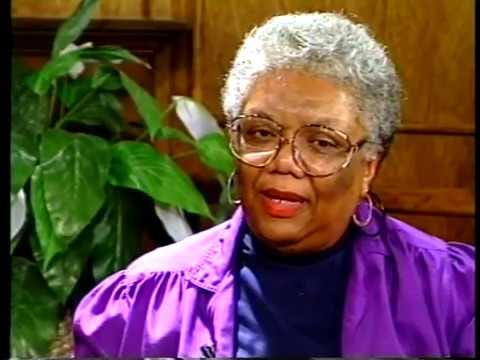Lucille Clifton: “come celebrate / with me that everyday / something has tried to kill me / and has failed.”
Today's magnificent poet wrote compact poems about foxes and crabs, race and slavery, dreams and injustice
“In the choice between things and people, I choose people.”
— Lucille Clifton, in a Christian Science Monitor interview
Part of what I love about this National Poetry Month project is the nudge to learn more about poets. I had read a few of Lucille Clifton’s poems, such as the memorable “homage to my hips,” and they had stayed with me — but what did I know of her? Not much, I confess. And, of course, she was extraordinary.
Lucille Clifton entered the poetry publication world via Langston Hughes, who first included a few of her poems in an anthology. She wrote numerous books — both poetry books and children’s books. She won the National Book Award, and two of her books were nominated for the Pulitzer Prize. She had six children and wrote her poems in the crevices of a full and busy life.
And as a native Marylander, I was delighted to learn that Lucille was a Maryland poet.
She was born in New York, and called Buffalo home, but she lived in Maryland (her “second home”) for many years. She taught at Coppin State and then St. Mary’s College of Maryland, and died in Baltimore in 2010. When I was born, in the late 1970s, Lucille Clifton was the Maryland Poet Laureate.
Some of her poems tap into her time in Southern Maryland, such as “blessing of the boats,” which ends:
open your eyes to water water waving forever and may you in your innocence sail through this to that
Listen to her read the poem “crabbing (the poet crab speaks)” and share much more in this charming Howard County library video with Roland Flint, who was also at one point the Maryland Poet Laureate.
A Lucille Clifton poem has a distinct style — no capitalization, short lines, tight. Her topics are wide, delving across race, history, the human body, animals, dreams, slavery, family, and so much more.
Here’s how “homage to my hips” begins:
these hips are big hips they need space to move around in. they don't fit into little petty places. these hips are free hips.
Read the full poem — the ending might make you chuckle!
Other poems are more somber, laying cruelty bare, noticing the injustices, the danger, and the resilience demanded to survive.
Lucille’s poem “won’t you celebrate with me,” about the life she has carved for herself, ends with the searing lines:
… come celebrate with me that everyday something has tried to kill me and has failed.
In 2019, poet Reginald Dwayne Betts wrote in The New York Times about the powerful impact Lucille’s poems had on him:
“Her poems touch the political, the personal, the spiritual. In “september song,” Clifton writes of 9/11 in a way that could be about the mass shootings that seem to happen daily now. She writes, “some of us know / we have never felt safe / all of us americans / weeping.” And she writes, “and this is not the time / i think / to ask who is allowed to be / american America.” Reading that, I realize that then was the time, as is now. And I’m reminded mostly that Lucille Clifton helped me hear things — helps all of those who love her work hear things that they would rather ignore.”
One of Lucille’s most well-known quotes, was a line she said she originally “heard an old preacher say a long time ago:”
“I come to comfort the afflicted and to afflict the comfortable.”
What but poetry could manage both so well?
More, please
Read about Lucille Clifton’s life and work. (Poetry Foundation)
Scroll to the end of this page for dozens of her poems. (Poetry Foundation)
A fascinating interview: She Could Tell You Stories (Poetry Foundation)
In Praise of Lucille Clifton — by poet Reginald Dwayne Betts (NYT gift link)
Listen to Pádraig Ó Tuama read Lucille’s poem “song at midnight” on the Poetry Unbound podcast.
Lucille Clifton selects and shares three poems (American Academy of Arts and Sciences bulletin, 2000)
Does this exploration of Lucille Clifton make you curious about a poet you adore? Or perhaps who is behind a long-beloved poem? What will you discover? Let us know — we’d love to hear.
See you tomorrow with another poet!
Brianne




